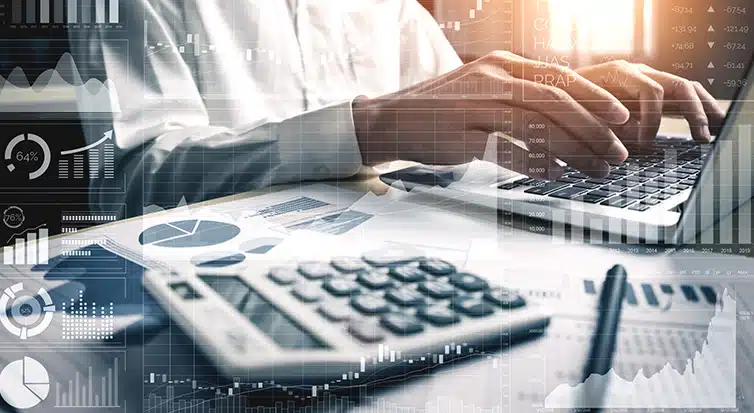Technology has revolutionised all sectors, yet our awareness of these changes varies. The impact of eCommerce and CRM platforms on shopping habits is immediately apparent to many. However, the subtler shifts in the accounting industry might not be as easily recognised.
When one says the word “accounting,” they still picture people wearing formal business attire and horn-rimmed glasses surrounded by stacks of paper, ledgers, and calculators, working through numbers by hand.
But the truth is, many accounting technology trends and concepts like Metaverse and Generative AI have taken the world by storm and are fast becoming part of the standard accounting toolkit.
In this blog post, we will talk about some of the key trends that are redefining accounting:
1. Blockchain
Blockchain is a distributed database or ledger technology that allows data to be securely stored and shared across a network of computers.
It is best known as the underlying technology behind cryptocurrencies like Bitcoin, but its applications extend to asset management, supply chain, and beyond.
Blockchain is also one of the most powerful accounting technology trends. Applied correctly, it can be a complete replacement for activities like bookkeeping and reconciliation.
Blockchain gives accountants complete clarity over financial information, asset ownership transfer, and data verification at each stage. Here are some use cases of Blockchain in accounting:
- The technology can automate reconciliation, a time-consuming task for accountants. By recording transactions on a shared ledger, both parties in a transaction have access to a single, immutable version of the ledger, which boosts data credibility.
- The immutable nature of Blockchain makes it an effective tool for reducing fraud. Once data is entered into the Blockchain, it cannot be altered without the consensus of the parties involved, making it difficult for anyone, including hackers, to manipulate records.
- Smart contracts can automate various auditing processes by predefining conditions for transactions and financial reporting. These contracts can execute and verify compliance automatically, reducing the need for manual auditing and increasing accuracy.
- Blockchain enables precise tracking of sales, purchases, and other taxable events, ensuring that all accounting activities are accurately reported to tax authorities, which, in turn, leads to a reduced risk of penalties for non-compliance.
Using Blockchain does not by any means imply that accountants will be replaced. Instead, the scope of an accountant’s role will move away from conventional tasks and towards transactional accounting, such as taking over the authentic economic interpretation of Blockchain records.
This could involve checking up on the actual location and worth of an asset whose ownership has been recorded or determining the recoverable value of a debtor. Overall, Blockchain can tremendously increase the efficiency and value of the accounting function.
2. Generative AI
Generative AI, a subset of Artificial Intelligence, focuses on generating new content and data using Natural Language Processing (NLP), specifically Large Language Models (LLMs).
This technology can analyse vast amounts of data, learn from it, and generate predictions, reports, and insights. It is no surprise that it is viewed as one of the most vital accounting technology trends to watch.
Here are some of the ways Generative AI is being used in accounting:
- It can automate entering data into accounting systems and categorising transactions correctly, ensuring proper data organisation and minimal errors.
- By analysing patterns and anomalies in accounting data, Generative AI can identify potential fraud or financial discrepancies more efficiently than traditional methods. Its ability to learn from ongoing transactions allows it to adapt to new tactics used by fraudsters.
- Generative AI can optimise tax strategies by analysing tax regulations and company data to identify efficient tax compliance methods, generate tax-saving suggestions, and automate tax return preparation for enhanced efficiency.
- It can help accounting firms provide more personalised and sophisticated services by analysing client data to generate insights and recommendations tailored to each client’s unique financial situation.
However, it is essential to note that advanced AI platforms like ChatGPT do not use real-time data, and with any AI application, it is vital to remember that there is no substitute for the human touch. Using any technology is only as good as the person manoeuvring it.
It is crucial for accountants not to depend solely on AI and to cross-verify outcomes and suggestions whenever necessary. They should not allow Generative AI to compromise the quality of their services.
Rather, they must use it to deliver exceptional client service and gain a competitive advantage. Still, Generative AI is certainly one of the accounting automation trends that pretty much every accounting firm will adopt in some way or another.
3. Internet of Things (IoT)
IoT refers to the network of physical objects embedded with sensors, software, and other technologies to connect and exchange data with other devices and systems over the internet.
From manufacturing equipment to wearables, IoT has found use in different strata of business and life in the past decade. Today, it is regarded as one of the biggest accounting technology trends to watch out for.
Accountants can use IoT to gain more detailed real-time insights into financial data, enabling greater task efficiency and accuracy.
For instance, using barcode scanners, details of a client’s purchase can be instantly scanned and sent to the accounting team, who can then automatically log in to the books of accounts through connected bookkeeping software.
Similarly, smart sensors can collect all relevant data from multiple departments like inventory and operations and instantly parse them into meaningful insights.
This allows accountants to maintain up-to-date records, be instantly alerted to anomalies or suspicious activity, and keep tabs on the client’s financial health.
Lastly, IoT can streamline compliance and reporting by automatically collecting and reporting data required by regulatory bodies.
This reduces the manual effort needed to compile compliance reports and helps accountants ensure clients meet regulatory requirements efficiently.
4. Embedded analytics
Embedded analytics involves the integration of analytical capabilities within an existing business tool. This enables users to access, analyse, and visualise data without needing to switch between different applications or platforms and gain powerful insights with ease.
In many ways, this is one of the most significant accounting technology trends. It offers a highly convenient option for accountants to get used to predictive analytics, as they can continue to use the accounting software they are comfortable with.
Here is the impact of embedded analytics in the accounting sector:
- The technology provides real-time access to financial data and insights directly within the accounting software. Accountants can monitor indicators such as cash flow, profitability, and expense trends, enabling quicker responses to challenges and opportunities.
- With embedded analytics, accountants can create detailed financial reports, dashboards, and visualisations directly accessible within their accounting systems. This capability makes it easier to share insights with stakeholders.
- Accountants can automate routine data analysis tasks, reducing the time and effort required to compile and interpret financial data. This automation frees them to focus on more strategic activities, such as financial analysis, risk management, and advisory services.
Without a doubt, embedded analytics serves as a “stepping stone” to more elaborate accounting innovations. The case for investing in analytics, of course, makes itself.
With a finger on the pulse of the financial numbers, accountants can monitor the client’s financial health, invest promptly in the right opportunities, make decisions to improve their profitability and save considerably on time and resources spent.
5. Metaverse
The Metaverse is a collective virtual shared space created by the convergence of virtually enhanced physical reality, Augmented Reality (AR), and the internet. In simple words, it involves users interacting virtually in real time through simulated scenarios.
The technology offers immense potential for new ways to operate a business and interact with customers.
In the accounting context specifically, the Metaverse holds many possibilities for building client relationships across the globe and offering real-time accounting services, as well as creating a more closely connected practice staff through virtual interactions.
Everyone in the team can socialise, undergo training and have meetings in real-time with the extra benefit of a realistic presence without compromising on remote working.
In fact, US-based CPA firm Prager Métis recently opened up Metaverse virtual headquarters on Decentraland, a virtual reality platform.
Additionally, accounting firms can leverage the Metaverse to visualise complex financial data in three dimensions, making it easier to identify trends, anomalies, and insights.
This immersive approach to data analysis can enhance decision-making processes and provide a more intuitive understanding of financial information.
The emergence of this technology allows accounting firms to also offer new types of services, such as virtual CFO services, Metaverse-specific tax consulting (for transactions and activities that occur within virtual environments), and advisory services for clients looking to enter or expand their presence in the Metaverse.
According to Goldman Sachs, up to 33% of global spending could eventually be tied to the Metaverse. So, while its actualisation could still be a long way off, it is a good idea for accountants to start learning about this radical technology that could soon power digital transformation in accounting.
6. Outsourced accounting
Outsourcing has always been an integral component of the operational strategy for many accounting firms worldwide, leveraging external resources to enhance efficiency, access specialised expertise, and improve service delivery. The UK is no exception.
Although outsourcing typically does not fit in the list of top accounting technology trends, it does so in a quintessential way, thanks to technological advancements, globalisation, and the evolving demands of the accounting profession.
This year, several key factors are driving the adoption and evolution of accounting outsourcing:
- Outsourced accounting firms provide access to an expert team with knowledge across various sectors and the latest accounting standards—valuable for accountants helping their clients navigate complex regulatory environments or expand into new markets.
- Cloud computing has made outsourced accounting more efficient and accessible. Cloud-based accounting platforms enable real-time collaboration between accountants and their outsourced accounting firms, leading to better financial visibility and decision-making.
- With increasing concerns about data security, outsourced accounting firms are adopting stringent security measures to protect sensitive financial information. This includes using encrypted data transmission, secure data storage practices, and compliance with international data protection regulations.
- Outsourced accounting firms implement AI technology to automate routine tasks, improve financial decision-making, and utilise predictive analytics. This provides accountants access to advanced financial analysis, reporting, and management tools without requiring significant investment in software or staff training.
Final words
Accounting has long moved out of the realm of just bookkeeping and balance sheets, and in 2024, it is set to be more dynamic than ever, and these accounting technology trends prove that.
Stellaripe has always believed in upgrading itself with the latest tools and strategies to deliver superior customer services, gain a competitive edge, and drive higher revenues.
This blog post clearly indicates that automation, analytics and technological transformation are indeed gaining steam and, in many ways, becoming the new norm rather than just a “trend.”
Going forward, accountants must be as comfortable with technology and its evolving faces as accounting rules and know how to combine the two best to meet business goals.
They will also need to stay nimble and resilient as they adopt new trends and keep an eye on emerging ones. In short, the future of accounting is here, and it is up to accountants to define when they want to join the ride.
If you want to take the first step and learn more about optimising your accounting firm processes with outsourcing, contact us, and we will take you through its benefits.




